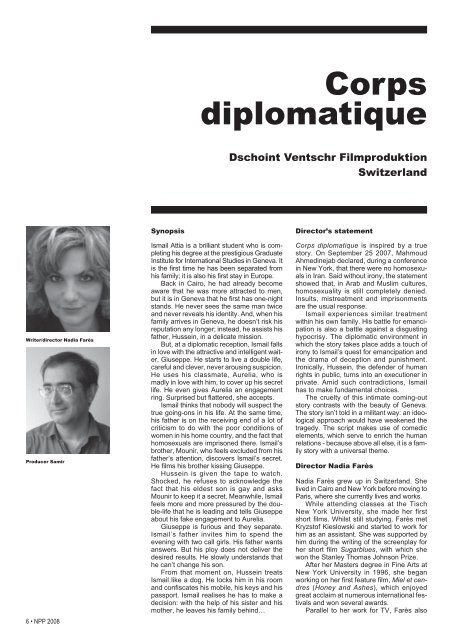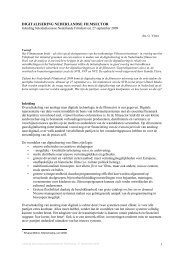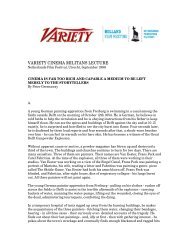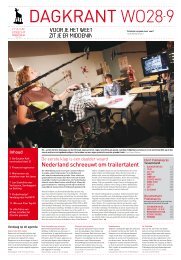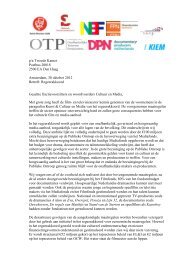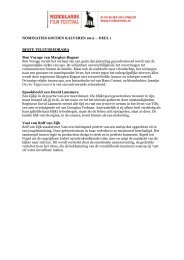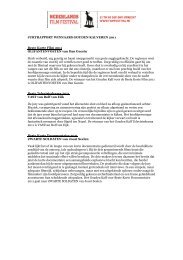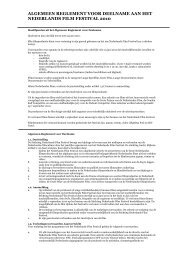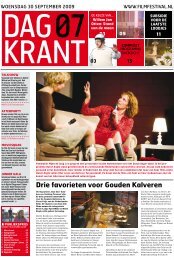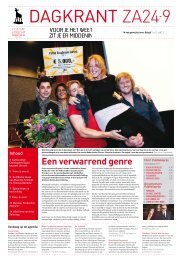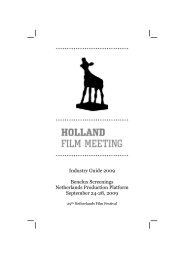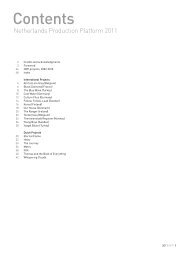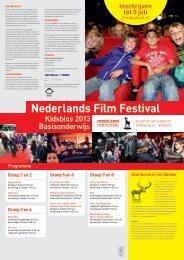Netherlands Production Platform - Nederlands Film Festival
Netherlands Production Platform - Nederlands Film Festival
Netherlands Production Platform - Nederlands Film Festival
Create successful ePaper yourself
Turn your PDF publications into a flip-book with our unique Google optimized e-Paper software.
Corps<br />
diplomatique<br />
Dschoint Ventschr <strong>Film</strong>produktion<br />
Switzerland<br />
Writer/director Nadia Farès<br />
Producer Samir<br />
6 • NPP 2008<br />
Synopsis<br />
Ismail Attia is a brilliant student who is completing<br />
his degree at the prestigious Graduate<br />
Institute for International Studies in Geneva. It<br />
is the first time he has been separated from<br />
his family; it is also his first stay in Europe.<br />
Back in Cairo, he had already become<br />
aware that he was more attracted to men,<br />
but it is in Geneva that he first has one-night<br />
stands. He never sees the same man twice<br />
and never reveals his identity. And, when his<br />
family arrives in Geneva, he doesn’t risk his<br />
reputation any longer; instead, he assists his<br />
father, Hussein, in a delicate mission.<br />
But, at a diplomatic reception, Ismail falls<br />
in love with the attractive and intelligent waiter,<br />
Giuseppe. He starts to live a double life,<br />
careful and clever, never arousing suspicion.<br />
He uses his classmate, Aurelia, who is<br />
madly in love with him, to cover up his secret<br />
life. He even gives Aurelia an engagement<br />
ring. Surprised but flattered, she accepts.<br />
Ismail thinks that nobody will suspect the<br />
true going-ons in his life. At the same time,<br />
his father is on the receiving end of a lot of<br />
criticism to do with the poor conditions of<br />
women in his home country, and the fact that<br />
homosexuals are imprisoned there. Ismail’s<br />
brother, Mounir, who feels excluded from his<br />
father’s attention, discovers Ismail’s secret.<br />
He films his brother kissing Giuseppe.<br />
Hussein is given the tape to watch.<br />
Shocked, he refuses to acknowledge the<br />
fact that his eldest son is gay and asks<br />
Mounir to keep it a secret. Meanwhile, Ismail<br />
feels more and more pressured by the double-life<br />
that he is leading and tells Giuseppe<br />
about his fake engagement to Aurelia.<br />
Giuseppe is furious and they separate.<br />
Ismail’s father invites him to spend the<br />
evening with two call girls. His father wants<br />
answers. But his ploy does not deliver the<br />
desired results. He slowly understands that<br />
he can’t change his son.<br />
From that moment on, Hussein treats<br />
Ismail like a dog. He locks him in his room<br />
and confiscates his mobile, his keys and his<br />
passport. Ismail realises he has to make a<br />
decision: with the help of his sister and his<br />
mother, he leaves his family behind…<br />
Director’s statement<br />
Corps diplomatique is inspired by a true<br />
story. On September 25 2007, Mahmoud<br />
Ahmedinejab declared, during a conference<br />
in New York, that there were no homosexuals<br />
in Iran. Said without irony, the statement<br />
showed that, in Arab and Muslim cultures,<br />
homosexuality is still completely denied.<br />
Insults, mistreatment and imprisonments<br />
are the usual response.<br />
Ismail experiences similar treatment<br />
within his own family. His battle for emancipation<br />
is also a battle against a disgusting<br />
hypocrisy. The diplomatic environment in<br />
which the story takes place adds a touch of<br />
irony to Ismail’s quest for emancipation and<br />
the drama of deception and punishment.<br />
Ironically, Hussein, the defender of human<br />
rights in public, turns into an executioner in<br />
private. Amid such contradictions, Ismail<br />
has to make fundamental choices.<br />
The cruelty of this intimate coming-out<br />
story contrasts with the beauty of Geneva.<br />
The story isn’t told in a militant way: an ideological<br />
approach would have weakened the<br />
tragedy. The script makes use of comedic<br />
elements, which serve to enrich the human<br />
relations - because above all else, it is a family<br />
story with a universal theme.<br />
Director Nadia Farès<br />
Nadia Farès grew up in Switzerland. She<br />
lived in Cairo and New York before moving to<br />
Paris, where she currently lives and works.<br />
While attending classes at the Tisch<br />
New York University, she made her first<br />
short films. Whilst still studying, Farès met<br />
Kryzstof Kieslowski and started to work for<br />
him as an assistant. She was supported by<br />
him during the writing of the screenplay for<br />
her short film Sugarblues, with which she<br />
won the Stanley Thomas Johnson Prize.<br />
After her Masters degree in Fine Arts at<br />
New York University in 1996, she began<br />
working on her first feature film, Miel et cendres<br />
(Honey and Ashes), which enjoyed<br />
great acclaim at numerous international festivals<br />
and won several awards.<br />
Parallel to her work for TV, Farès also


